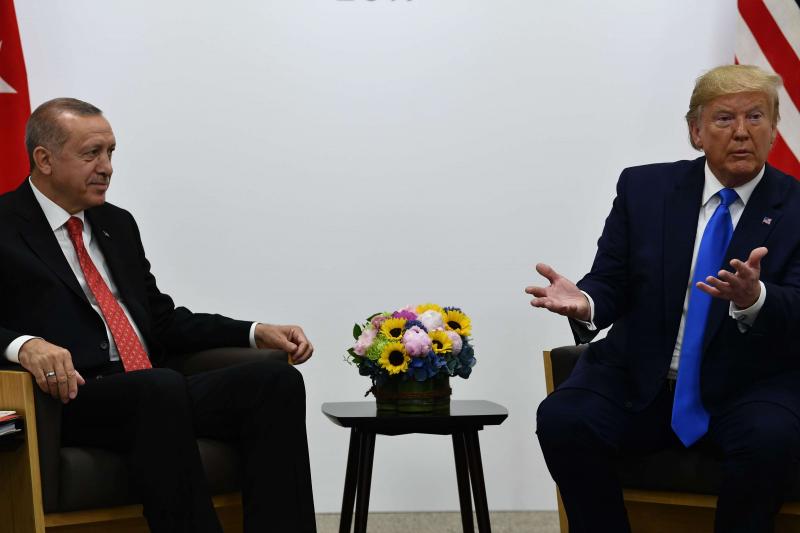The US presidency has just gone even more global

A puzzling relationship. US President Donald Trump (R) and Turkish President Recep Tayyip Erdogan meet on the sidelines of the G20 Summit in Osaka, June 29. (AFP)
What’s clear from the formal impeachment inquiry is that Trump seems to want the whole world to participate in US politics.
US President Donald Trump’s abrupt shift in Syria policy — after a phone call with Turkish President Recep Tayyip Erdogan — provoked anger and dismay in the United States and consternation elsewhere.
There is also puzzlement. What could Erdogan have possibly offered Trump in return for the promise of a tactical US retreat from the very areas of north-eastern Syria that the Turks have invaded?
The incurably cynical and the intensely suspicious suggest there had to be a quid pro quo and that it had to be in the form of some personal gain for Trump, politically or in some other way, against getting carried away with such speculation.
Jonathan Bernstein of Bloomberg raised the issue as follows: “When Trump personally and inexplicably reverses US policy immediately after a conversation with a foreign leader, it’s hard not to wonder exactly what motivations are at work.” Ryan Lizza of Politico posted on Twitter that Trump has a property in Turkey: “This is why presidents divest. It is crazy that a president is making national security decisions like the one tonight when he has lucrative business relationships at stake in the country that will benefit.”
Nothing has emerged to substantiate the suggestion that Trump Towers Istanbul was a factor in Trump’s decision to accommodate Erdogan. That said, there is one obvious political benefit to Trump from his stated decision to withdraw US troops from Syria: Trump may find it politically helpful on the 2020 campaign trail to portray the new US posture in Syria as part of his campaign to end “endless wars.”
Suspicions about Trump’s motivations in almost every policy decision are hardly surprising. Consider this:
Last month, at the UN General Assembly, Trump repeated his view of globalisation. He said he was opposed to it and affirmed his belief in nationalism and national sovereignty. That was controversial but not as much as the alternative, as revealed by two whistle-blower complaints about Trump’s actions and pronouncements.
What’s clear from the formal impeachment inquiry under way in the United States is that Trump seems to want the whole world to participate in US politics, US foreign policy in general and in the 2020 presidential election in particular.
Walter Dellinger, former head of the US Office of Legal Counsel and an emeritus professor of constitutional law, recently noted that Trump’s private chat with Ukraine’s leader on investigating his political rival Joe Biden, and his subsequent public calls for Ukraine and China to do the same, is a “simple” story.
“The president is asking for foreign governments to try to decide who the next president of the United States is and to play a role in making that decision,” Dellinger said. “There is nothing more fundamentally wrong than that in a democratic republic… the 2020 election is corrupted and influenced by foreigners.”
He added: “If there was anything that the framers of the [US] Constitution feared most, it was foreign inter-meddling in our elections. They feared that we would be the plaything of European politics — there would be a French party and a British party and that they went through the emoluments clause and through many other parts of the Constitution to try to ensure that American elections were independent.”
Clearly, the most ludicrous extrapolation of Trump’s motivation on Syria and Ukraine would be as follows: He has made the office of the US president truly global, one in which foreign actors have a say in the choice. That isn’t the way it should be but Trump has an unusual approach to ethics and propriety.
The issue of global opinions and preferences with respect to US presidential candidates does raise an interesting issue. For decades, the world has routinely polled itself on its preferred candidate for the White House. The Middle East and North Africa region, for instance, regularly assesses who would get its vote, were it to have the chance to cast a ballot on the United States’ Election Day.
Of course, American presidents have long struggled against the idea that their office must represent global concerns. The worldwide hopes for and expectations of Barack Obama when he was elected in 2008 were simply overwhelming. In Aligarh, India, just weeks after Obama’s election, I remember university students saying the new US president owed it to the world to sort out a number of things or would have ignored his mandate (of worldwide goodwill), they said.
A couple of years on and I was hearing the same sort of things in Afghanistan. People behaved as though Obama were their president, not just the leader of the United States.
However, elections are supposed to be local and foreign policy is meant to answer national needs. Trump is falling short on both counts.
Originally published in The Arab Weekly

